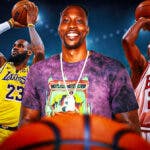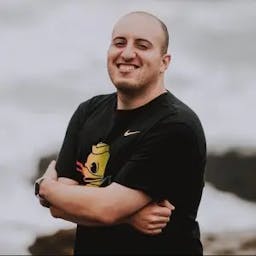Episodes 7 and 8 of ESPN's docuseries “The Last Dance” took viewers through a ride to relive Michael Jordan's first retirement from the NBA, his stint as a baseball player, and the many anecdotes that ensued.
Here are the eight best things from Sunday's episodes as the series heads into a crescendoed finale on May 17.
Michael Jordan’s first retirement
Michael Jordan's initial retirement came as a shock to many, but others saw it as a reasonable conclusion to years of overwhelming criticism, which had turned into a witchhunt.
The murder of his father, James, had taken a big toll on Jordan, as well as the raining accusations of a potential connection between his death and Jordan's gambling forays. Bulls owner Jerry Reinsdorf had heard from agent David Falk that Jordan might retire, but he found out for sure during a White Sox game in which Jordan threw out the first pitch.
After talking to Falk, Reinsdorf told Jordan he couldn't make a decision before talking with coach Phil Jackson first, but the latter was wholly understanding of his reasoning.
Reporters soon chimed in with conspiracy theories, the most prevalent among them revolving around then-commissioner David Stern imposing a secret 18-month ban due to his gambling.
In “The Last Dance,” Stern laughs off this conspiracy, and NBA public relations extraordinaire Brian McIntyre gives his blunt thoughts on the media circus surrounding Jordan's retirement:
“How can I phrase this delicately? Total bulls**t. Can you use that? Total bulls**t.”
“Rare Air” author Mark Vancil echoed these sentiments with a little more detail:
“The conspiracy stuff was stupid because I had sat with him a year earlier and he told me what he was gonna do,” said Vancil. “In the summer of ’92 — that’s The Dream Team summer — you could tell that he was really tired. As tired as he looked and as beat up as he looked.
“They said, ‘So, what are you gonna do?’ There was a long pause and he said, ‘I’m gonna shock the world. I’m gonna quit and go play baseball.’ When? He said, ‘I’d do it right know, except Bird and Magic never won three in a row and I gotta do the Olympics. If it wasn’t for that, I’d be playing baseball this summer.’”
Jordan said of his retirement that he “was at peace with that decision” and “felt ready” — noting he stepped away from the game with the intent of not coming back, but leaving the door open anyway.
Had it not been for the 1992 Barcelona Olympics and a quest for a three-peat, it appears Jordan might have run away to the diamond a year sooner than he did.
Michael Jordan: The baseball player
Michael Jordan returned to his original love of baseball by signing a minor league deal with the Birmingham Barons, a Double-A affiliate of the Reinsdorf-owned Chicago White Sox.
As Reinsdorf explained in Episode 7 of “The Last Dance,” players usually start at Rookie Ball or Single-A, but the Sox had no other option but to put him in Double-A, given that no other level could handle what a Jordan media availability would look like.
Mike Barnett, the Barons' hitting coach at the time, recalls that one forgotten nugget about Jordan's stint in the minor leagues is that he started his career with a 13-game hitting streak. Opponents soon caught up to his fastball-hitting ways, and Barnett claims he did not see another fastball for a month and a half.

Jordan slumped and was heavily criticized for daring to cross over to another sport and believing he'd dominate. Sports Illustrated tore him down with an opinion piece that made the cover, something that forever damaged the relationship between Jordan and the magazine.
Jordan hit .202 in the minors and knocked in 50 runs. Then-Barons manager Terry Francona and Reinsdorf were amazed he hit over the Mendoza line after not playing baseball consistently since he was 17 years old.
Perhaps what was most telling is how Jordan constantly worked at getting better with his off-speed hitting, admittedly growing blisters from taking so much batting practice.
Barnett said he never saw greater work ethic in any player he has ever coached, and Reinsdorf admitted in “The Last Dance” that Jordan would have made it to the majors if he kept playing baseball.
Jordan's time with baseball would eventually come to a close after the strike in 1994, which lasted nearly a whole calendar year.
Scottie Quitten
The last portion of “The Last Dance” Episode 7 paints the picture of a post-Jordan Bulls era with sidekick Scottie Pippen taking the bastion of a go-to player.
While the Bulls managed to make the playoffs that season, they also missed Pippen during a crucial stint in the 1994 NBA Playoffs, as he chose to sit during a last-second play coach Phil Jackson had drawn up for a rookie Toni Kukoc in Game 3 of the Eastern Conference Semifinals against the New York Knicks.
Pippen was outraged that Jackson had picked Kukoc, even if the Croatian import had hit plenty of game-winning shots in the uniform already. Jackson asked Pippen to be the inbounder for that play, only to finish the sideline spat by asking him, “Are you in, or are you out?”
Pippen felt insulted:
“I felt like it was an insult from Phil,” said Pippen. “I was the most dangerous guy on the team. So why are you asking me to take the ball out?”
Pippen chose to sit out, but Jackson proceeded with the play, which resulted in a Kukoc turnaround game-winning jumper to get right back in the series after losing the first two games.
Role players like Steve Kerr and Bill Cartwright were quick to notice Pippen sitting out that last play, and they didn't hesitate to let him know afterward. A crying Cartwright gave an emotional speech in the locker room, saying he couldn't believe Pippen quit on the team.
Jordan recalls it as a moment Pippen would come to regret:
“It's always going to come back to haunt him at some point in some conversation,” Jordan said. “Pip knows better than that.”
Pippen was regretful but unapologetic about the incident:
“It's one of those incidents that I wish had never happened,” said Pippen. “But if I had a chance to do it all over again, I probably wouldn’t change it.”
Pippen was an incredible player who had a lot of success, but he certainly had a drama-filled time in Chicago.
“I’m Back”
After meeting with former teammate B.J. Armstrong and agreeing to swing by the practice facility, Jordan found himself in familiar confines, soon engaging in a little game of one-on-one against Armstrong.
Soon enough, Jordan planned to come back. David Falk prepared several draft statements for him to send out to the media. Jordan skimmed through them and didn't like any, so Falk handed him a pen for him to write his own.
All Jordan wrote was “I'm back,” which was immediately faxed to local and national publications.
In 1995, the Bulls were 34-31 before Jordan rejoined them for the last 17 games of the regular season, donning No. 45 (one of his high school jersey numbers). “The Last Dance” shows how in his first game back against the Indiana Pacers, he put his shorts on backward and missed his first six shots before salvaging a 19-point, six-rebound, six-assist performance in a losing effort.

It took Jordan only three more games before he regained his otherworldly scoring prowess, soon dropping 55 points against the New York Knicks at Madison Square Garden, a performance dubbed as “The Double-Nickel Game.”
After bouncing the Charlotte Hornets out of the first round (3-1), the Bulls ran into the Orlando Magic, who defeated them 4-2 in the Eastern Conference Semifinals. After Game 1, in which Jordan scored 19 points, shot 8-of-22 from the floor, and committed several late gaffes, Magic point guard Nick Anderson told the press that “45 isn't 23,” prompting Jordan to revert to wearing his usual No. 23.
Jordan’s a**holery
That 1995 offseason was a testament to Michael Jordan's drive, as longtime trainer Tim Grover recalls offering to be available for whenever he was ready to hit the weights:
“If you’re gonna take three hours out of your day to watch me play. I have an obligation to give you my best. To give my best every time,” Grover recalled Jordan saying.
His Airness didn't make any excuses but was furious to see former teammate Horace Grant move on to the Eastern Conference Finals while celebrating a win over his former team. That slight drove him to push even harder in the offseason:
“Looking back I didn’t have enough time to get my body back into a basketball body,” Jordan admitted in the episode.
While Jordan pushed his body to the limit, he also pushed his teammates to immeasurable standards. Former teammate Will Perdue summed it up well.
“Let’s not get it wrong: He was an a**hole, he was a jerk, he crossed the line numerous times,” said Perdue. “But as time goes on you think back about what he was actually trying to accomplish — you’re like, he was a hell of a teammate.”
Perdue, Steve Kerr, Scott Burrell, and many others noted that while Jordan was notably harsh on his teammates, he always did so with a vision in mind:
“Look, winning has a price,” says Jordan. “And leadership has a price. So I pulled people along when they didn’t want to be pulled. I challenged people when they didn’t want to be challenged. And I earned that right because my teammates who came after me didn’t endure all the things that I endured. Once you joined the team, you lived at a certain standard that I played the game. And I wasn’t going to take any less. Now if that means I had to go in there and get in your a** a little bit, then I did that. You ask all my teammates, the one thing about Michael Jordan was he never asked me to do something that he didn’t f***ing do.”
Jordan then explained the perception of it all, as his voice cracked:
“When people see this they are going say, ‘Well he wasn’t really a nice guy. He may have been a tyrant.’ Well, that’s you, because you never won anything. I wanted to win, but I wanted them to win to be a part of that as well. Look, I don’t have to do this. I am only doing it because it is who I am. That’s how I played the game. That was my mentality. If you don’t want to play that way, don’t play that way.”
This passage. I mean… pic.twitter.com/WGw57oUUVE
— Rachel Nichols (@Rachel__Nichols) May 11, 2020
Jordan asked for a break as he explained this, clearly on the verge of tears during one of the most emotional scenes of “The Last Dance.”
Jordan punches Steve Kerr
One of the most awaited moments of “The Last Dance” was the confrontation between Michael Jordan and a young Steve Kerr.
Phil Jackson had put the 6-foot-2 Kerr as Jordan's primary defender in practice and continued to call fouls on Jordan, something the superstar was greatly bothered by. Jordan proceeded to foul Kerr hard, and Kerr responded with a punch to the chest:
“He hauls off and hits me in the chest, and I just haul off and hit him right in the f**king eye. And Phil (Jackson) just throws me out of practice.”
"I just haul off and hit him right in the f—ing eye. And Phil just throws me out of practice."
Episodes 7 & 8 air next Sunday at 9 PM ET on ESPN 📺 #TheLastDance pic.twitter.com/ONZAnjlcbc
— SportsCenter (@SportsCenter) May 4, 2020
Jordan admitted he felt “about this small” after punching one of the smallest guys in the team, soon asking Scott Burrell for Kerr's phone number to apologize.
Kerr admits that might have been his greatest contribution to the team that season. Kerr was proud to stand up to Jordan, and their fight ultimately allowed Jordan to further work on his leadership.
The LaBradford Smith story
One of the best anecdotes from “The Last Dance” is the LaBradford Smith story. Smith had a very short NBA career as an underperforming first-round selection, but he went off for a career-high 37 points against Jordan and the Bulls on March 13, 1993.
As the tale has it, Smith told Jordan “good game, Mike” after the Bulls won that game, following what was an awful shooting night for the Bulls great.
Jordan took that as a personal slight and torched the Washington Bullets at the end of a back-to-back, going off for 36 points in the first half:
“He told me, `Cool off. Cool off.’ I said, `You didn’t cool off on me last night. Why should I cool off on you?’" – MJ
Jordan said he was going to score 37 in the 1st half against LaBradford Smith & ended up scoring 36 1st half points! https://t.co/ugrJ4gdzWt#TheLastDance pic.twitter.com/7IPf6yeNcx
— Ballislife.com (@Ballislife) May 10, 2020
As it turns out, Smith never said “good game, Mike” or anything close to it, admitting to it many years later. David Aldridge of The Athletic recalled knowing that was a farce, having covered that game for The Washington Post alongside colleague Melissa Isaacson of the Chicago Tribune.
Jordan was famous for taking any and every slight and turning it into a mental edge. As Aldridge describes it, Phil Jackson had torched Jordan for his poor performance and getting outclassed by Smith, which he made into a personal slight.
Jordan vs. The Glove
Episode 8 of “The Last Dance” ends detailing the Bulls' rousing success in the 1996 postseason, blazing past the Miami Heat (3-0), overcoming the Charlotte Hornets (4-1), and getting revenge with a sweep of the Orlando Magic (4-0) before reaching the NBA Finals.
The Bulls got off to a 3-0 lead against the Seattle SuperSonics, but reigning Defensive Player of the Year Gary Payton took the decision-making out of coach George Karl's hands and took over as Michael Jordan's primary defender.
Karl had hoped that keeping Payton off Jordan would result in more energy and more scoring for his side, but with the Sonics on the brink of elimination, he saw no other option but to let Payton guard Jordan.
Payton offered that his defense was the reason the Sonics won the next two games, but Jordan had a hearty laugh after seeing Payton's comments:
“The Glove,” said Jordan. “I had no problem (dealing) with The Glove. I had no problem with Gary Payton.”
No person, in the history of human kind, has ever said anything with more confidence than Michael Jordan saying "The Glove, I had nooooo problem with the Glove." pic.twitter.com/dHkGYglKT3
— Aaron Torres (@Aaron_Torres) May 11, 2020
While Payton actually did an admirable job on Jordan, MJ and the Bulls eventually bounced back with a 12-point win in Game 6 to win it all. Jordan put a bow on it with 22 points, nine rebounds, and seven assists to carve out the start of a would-be second three-peat, and winning the title on Father's Day made it even more emotional:
Raw and real.
MJ's first title without his dad by his side brought out every emotion. #TheLastDance pic.twitter.com/B1MuNT4OgA
— SportsCenter (@SportsCenter) May 11, 2020
Many had seen this image of Michael Jordan crying in the locker room after the '96 Finals, but “The Last Dance” had the audio to go along with it, showing just how much this meant to him.




